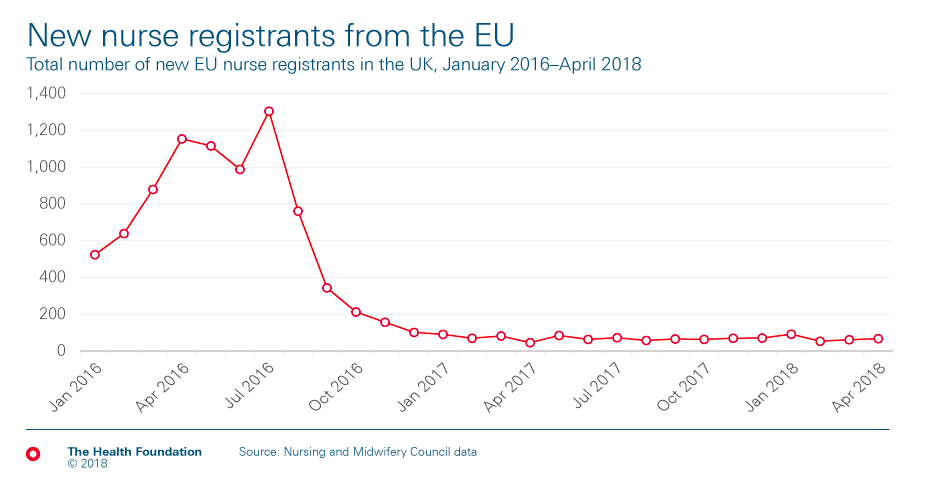Two charts that show how Brexit is hitting the NHS

The Government’s ‘hostile’ approach to EU immigrants has left Britain desperately short of nurses amid warnings Brexit is going to be ‘bad for the nation’s health’, according to a charity.
A drop in the international flow of nurses since the EU referendum in 2016 is down to a ‘triple whammy’ of reasons, says the Health Foundation.
They say that a combination of the ‘hostile environment‘ immigration approach from the Government, changes in the regulatory requirements for English language testing and the Brexit vote have all resulted in the drop.
The reduction is not because of a lack of recruitment interest from UK employers, the report states.
The Health Foundation says that the drop would be less concerning ‘if it was the result of a deliberate policy linked to increased UK based training of nurses’.
However, they say that there is ‘no evidence’ that the policy exists and that recent data shows vacancies for nurse and midwife posts continue to be at a historically high level, with around 34,700 vacancies advertised in the first quarter of 2018.

The warnings come as a new poll shows four in five doctors fear for the future of the NHS post-Brexit.
A survey of more than 1,000 medics found the majority believe the impact on the NHS of leaving the European Union will be negative.
The survey, published in the Journal of Epidemiology and Community Health, found nearly four-fifths (79%) voted remain in the referendum – significantly higher than the general population.
BREXIT DEVELOPMENTS – MORE ON YAHOO UK:
Article 49: What is it and how can it reverse Brexit after the UK leaves the EU?
How the ‘Brussels Effect’ will continue to run Britain’s economy long after Brexit
How will Brexit affect your finances in 2018?
The poll found being a surgeon or having a higher income was associated with more right-wing views while public health doctors and psychiatrists were more left-leaning.
Nearly all of the 1,172 UK doctors surveyed agreed European NHS staff should be able to remain in the UK.
The authors, led by an expert from the London School of Hygiene and Tropical Medicine, wrote: ‘Doctors in the UK have voted differently from the general public in recent polls.

‘Most doctors think Brexit will have a negative impact on the National Health Service.’
Commenting on the study, Dr Andrew Dearden, treasurer at the British Medical Association, said there should be a second referendum on the terms of the Brexit deal.
He said: ‘The challenges posed by Brexit are considerable and though there has been some progress, there is too much uncertainty around what the implications will be for doctors and the health service.
‘We already know, for example, that Brexit has already had a huge impact on the morale of EU NHS staff working here – our own research has shown us that almost half of NHS staff from the EU are considering leaving the UK because of the EU referendum.

‘Though concerns were raised prior to the Brexit vote, no one could have imagined the extent of the complications such a result would bring. However, in light of what we know now, it is imperative that the public has a say in any proposed Brexit deal.’
A Department of Health and Social Care spokesman said: ‘We want a deal with the EU that is good for the UK and good for the health service.
‘That is why we have continued to work closely with the European Union to ensure there is minimal disruption to the NHS after we leave.’

 Yahoo News
Yahoo News 